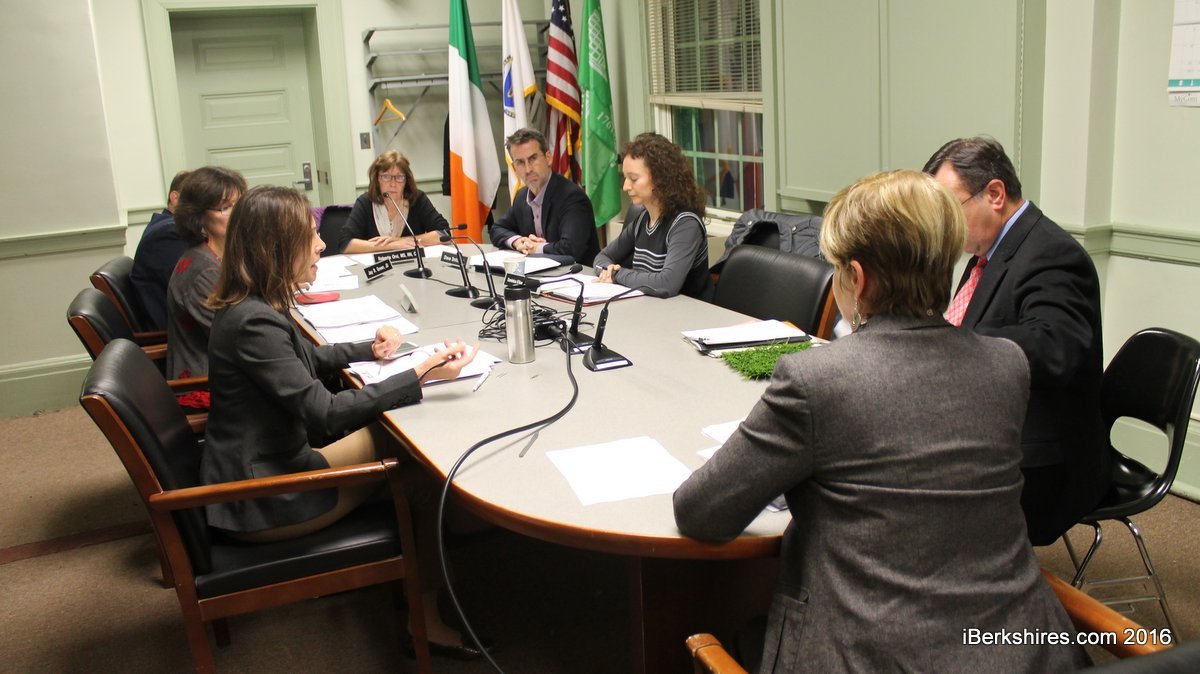Pittsfield Board of Health Keeping Eye On Turf Field ConcernsBy Andy McKeever, iBerkshires Staff
05:01PM / Thursday, November 03, 2016 | |
 The Board of Health met with Michael MacDonald and Ellen Kennedy about the field. The Board of Health met with Michael MacDonald and Ellen Kennedy about the field. |

BCC President Ellen Kennedy said the field will be for the entire city, not just the college.
PITTSFIELD, Mass. — The Board of Health is satisfied with the due-diligence put in by those proposing a turf field at Berkshire Community College.
Michael MacDonald and BCC President Ellen Kennedy followed up with the board on Wednesday about concerns raised a year ago. Turf fields have come under fire in recent years after a 2014 NBC news report questioned a link between the material in the artificial turf and lymphoma.
The turf field project was appealed for environmental concerns because of those materials but the state Department of Environmental Protection ultimately ruled in the turf field proponent's favor.
The state has allocated $1.1 million in a bond bill to help construct the field, which will be used by local sports from youth to the college level including becoming possibly becoming the new home field for the high school teams.The city is contributing another $200,000 for the project.
"Eighty percent of the scheduled football games that fall were not played on the day they were scheduled or were played on another field," MacDonald said of 2011, the year of Hurricane Irene and one that left the fields in poor condition.
For lacrosse, the players are practicing inside and the first time they step on a field is for the first game because there is nowhere to practice early in the season, he said. Meanwhile, games are being moved away from Wahconah Park at times because of field conditions. The artificial turf will rectify that and will allow for high school tournament games to be played in the county - which currently doesn't happen because the fields aren't up to par.
"We had to take our soccer field offline this fall just from the use of our youth soccer programs," Kennedy added.
In the last two years, 53 other artificial turf fields have been installed in Massachusetts, MacDonald said.
But the Board of Health isn't interested in that.
"Our purview is really to make decisions that are in the best interest of the health and well-being of the people in the community," Roberta Orsi, chairwoman, said.
MacDonald said that while the exact material for the field has yet to be determined, the ad-hoc committee heading the effort is playing it conservative. While it doesn't look like it will be able to afford a completely natural field, it is choosing from options that are potentially less hazardous - even though MacDonald says there hasn't been one single scientific study linking the diseases and the fields.
"The studies don't show there is a problem, but there is a perception," MacDonald said.
Board of Health member Cynthia Geyer has done her research and concurs, "there is very little data that there is harm." But Orsi reminded the board that there was no data linking PCBs to any health concerns when the General Electric used them in its factories.
MacDonald said the health concerns raised in recent years are still be analyzed. But, the committee is looking at either Nike Grind, an infill made from recycled shoes, or an encapsulated crumb rubber. MacDonald says the encapsulated rubber has been shown to reduce heavy metal leaching by 80 percent compared to the raw crumb rubber. He said the product has been shown to leech fewer chemicals than that of roadways and driveways.
He added that the environmental protections in place for the project will limit the amount of stormwater seeping through it - and keeping that from going to the wetlands.
As for the Nike Grind, that too has benefits but also more easily captures bacteria, which can lead to another host of health concerns, MacDonald said. There are pros and cons to every product and the group will be weighing all aspects of it equally - from health to the environment, to player safety, to cost.
"We made the decision before coming to the city council for the first time that for human health reasons we would change to these products," MacDonald said of the transition from the original plan to now looking at other options.
Overall, there are eight possible options for the committee to take. But that will depend on the bids and the budget moving forward.
"We continue to monitor. We are on top of every new report that comes out," MacDonald said.
The Board of Health had previously asked for more information but essentially took a play at your own risk stance. Board of Health member Jay Green said parents and teams still have the free will to decide about the potential risks, as the process unfolds.
"It is obviously an issue that is unfolding as it goes on," Green said. "I am satisfied that due diligence has been executed.
Geyer added that she hopes there will be ongoing studies about what chemicals are coming from the field as it ages and wears.
"Our concerns were on routine monitoring as the materials age," echoed Health Director Gina Armstrong said.
| 
 MEMBER SIGN IN
MEMBER SIGN IN
 MEMBER SIGN IN
MEMBER SIGN IN